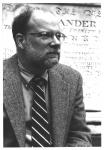Thirty years ago this week, rumors began circulating about the supposed extramarital affairs of Sen. Gary Hart, the leading candidate for the 1988 Democratic nomination for President.
In response, Hart challenged the media. He told The New York Times in an interview published on May 3, 1987, that…
Pork is not a partisan issue and not a new one. The term “pork barrel” is over a century old in its political sense, an allusion to the regular handing out of joints of salted pork, stored in barrels, by plantation owners to slave families before the Civil War. Because it is believed with nearly…
I did not mean to imply that Alger Hiss passed atomic secrets to the Russians. I used the atomic secrets image only as an example of a serious disclosure of classified information, as opposed to the trivial “outing” of someone who has had a desk job at Langley for the last several years and is such…
The Nobel Prize for Literature has just been awarded to the British playwright and screenwriter Harold Pinter. The good news, I suppose, is that at least I knew who he was when I learned about his prize. That is a good deal more than can be said for Elfriede Jelinek, John Maxwell Coetzee, and Imre…
Ellen Feldman writes that post-election fatigue is an unlikely reason for President Bush’s recent troubles, given “the amount of time he spent vacationing at his ranch before Katrina.” I’ve taken a few cheap shots myself over the years, so I don’t much mind this rather gentle one, especially as I’m…
The Bush Administration right now is going through a major bad patch.
Hurricane Katrina, the rising cost of oil, the Miers nomination, and the undropped shoe of the Valerie Plame investigation are but some of its troubles. As a result, Bush’s approval ratings are at the lowest point of his…
Fred Schwarz notes below that New York State has little that unifies it into a politically cohesive whole and that that is reflected in the state’s flag. Let me leave New York’s tangled politics and its even more tangled political history to another time and write a little about state flags.
They…
Joshua Zeitz blogged on Wednesday that some liberal pundits, such as the Washington Post’s E. J. Dionne, are happily opining that the present troubles of the Bush Administration are turning the President into a lame duck if not a dead duck. Perhaps so, perhaps not. A week can be an eternity in…
The 2005 Forbes 400 list is out, and once again, alas, I failed to make the cut.
And the cut this year is an altogether impressive $900 million. Only twenty-three on the list are worth less than a billion. A mere ten years ago, $340 million got you a spot among the American financial seraphim.
In…
Ellen Feldman, in her posting of September 19, wrote about the Bonus March in the early 1930s and Eleanor Roosevelt’s visit to demonstrators in early 1933. Leaving aside her highly dubious suggestion that a President of the United States should walk through the streets of a blacked-out city where…






